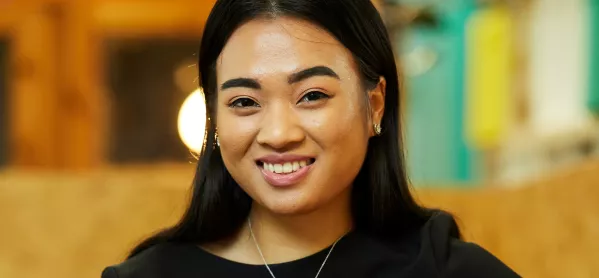- Home
- Meet Juliana Mohamad Noor, the NUS’ new FE leader
Meet Juliana Mohamad Noor, the NUS’ new FE leader

“Who knew that the little Malaysian girl voted for school council in Year 3 simply for being likeable by classmates, later went on to [win] a national election representing 4 million students in colleges and sixth-forms across the UK?” tweeted Juliana Mohamad Noor, shortly after being elected the NUS students’ union’s new vice-president for further education.
The expectations surrounding her new role, however, are rather more challenging. For one, Mohamad Noor is acutely aware that campaigning for more FE funding will be a major focus. “I will be a strong advocate for education funding throughout this process,” the 20-year-old from Liverpool tells Tes in her first major interview since taking office at the beginning of July.
“The education sector has significant financial barriers. In the Augar review, it is recommended that FE gets a lot of extra funding. We support that, but it can’t be taken from another part of the education system. It needs to be new money.”
Read more: Zamzam Ibrahim elected NUS national president
More news: Shakira Martin: ‘Politics doesn’t deserve me’
Background: Meet the NUS president and FE vice-presidential contenders
‘Continuing that narrative’
She says she also wants to see increased support for students and apprentices for things like transport costs, which she says is “a huge issue for apprentices”. Progress has been made, she believes, in raising awareness of the funding plight of FE. However, there is much left to be done: “It is a case of continuing that narrative. The more we talk about it, the more we can raise its profile and get people to understand that every part of the education system is equally important. We have to keep FE on the agenda.”
Mohamad Noor’s own journey in FE started when she found herself struggling with her A levels, and decided to move to the local college - City of Liverpool College - to study business. “I enjoyed both college and school, but I did better in college than in sixth form,” she says. “My A-level course was just not the course for me. So I thought I would go to college and do the subject that I was strongest in. That was a huge step from failing to leaving college with a distinction.”
She got involved with the union movement shortly after that: “I got involved through a series of clubs and societies that were really enjoyable, and so I wanted to see how else I could be involved.” She was elected vice-president initially, and then president of the college’s students’ association, before deciding to move on further. “I wanted to see what I could do at national level and how I can apply my experience to a wider student demographic,” she says.
‘The voices of the union’
The underrepresentation of FE in the union, and the public discourse more generally, are another motivator, she says. “I wanted to see the voices of the union heard. FE makes up a high proportion of the student cohort, but it is under-represented. It is a case of getting more people involved with NUS. I also wanted to break down the barriers students have not only in engaging with NUS but also in their unions, working on issues like islamophobia.”
Muslim students face a number of additional challenges in further education, explains Mohamad Noor - including a number around the Prevent strategy and issues like monitored prayer rooms. “During my term, what I want to achieve is to tackle Islamophobia and issues around Prevent. We want to better support Muslim students on and off campus. Campuses must be safe and welcoming for all.”
She would also like a more diverse range of voices in the FE curriculum, she explains. “One of the issues I want to focus on is the decolonisation of the curriculum. I want to see diversity the curriculum with more non-western thoughts. There has been a lot of work done in HE but a lot less in FE.”
A more accessible union
The financial crisis that hit the students’ union last year has led to significant reform, says the vice-president, and has left NUS ready to face its future. Now, she says, it is time to engage a broader range of students. “For some people, it would have been difficult to imagine what a world without NUS would have been like. It has been around for nearly 100 years. We have now built an organisation that is more affordable and more accessible. I am very proud to have been involved in the process to save NUS.”
Her first few months in post will be about listening, she stresses, and developing the right campaigns for the sector. “It will be good to visit unions regionally and understand what issues they face. I also want to understand better how we can support them.
Will she pursue a second year as vice-president? It is too early to say, she says. “I am very excited for all the work we have planned, looking at campaigns we want to do. I want to see this work develop, and I will decide from there.”
Keep reading for just £1 per month
You've reached your limit of free articles this month. Subscribe for £1 per month for three months and get:
- Unlimited access to all Tes magazine content
- Exclusive subscriber-only stories
- Award-winning email newsletters



